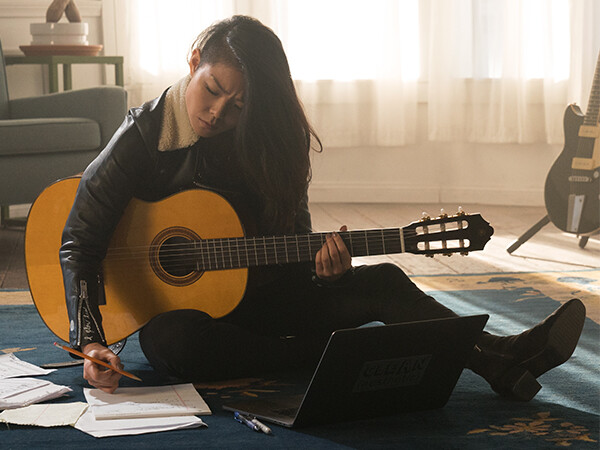Songwriting Therapy
Using music to go within.
I recently stumbled on a video conversation between Alanis Morrissette and Liz Phair in which they talked about why they write songs. The discussion resonated with me because, (a) it’s one of my favorite subjects; and (b) I’ve had similar creative callings.
The part of the conversation that spoke to me the loudest came when Liz talked about how her mental health relies on her ability to go within and write songs, and how she almost doesn’t know what she’s feeling until she actually writes the song. “I find that the older I get, the more I end up weeping when I’m writing because there’s something unblocking,” she says, adding that, if she wants to communicate a feeling to someone, “rather than writing an email or text that I regret, when I write the song, it just settles everything. Somehow, the universe needed to hear it more than that person did.”
Wow. Just wow.
I’ve personally experienced this phenomenon. When something is begging for attention — whether it’s a chip on my shoulder or a thump in my heart — sitting down at a piano or with Ruby (my Yamaha TransAcoustic guitar) at the very least loosens the lid. Ideally, I slip into the “zone” and an hour later I feel cleansed. Relieved. Reminded yet again of how the process itself almost never disappoints.
Songwriters are lucky. We have built-in therapy. It’s self-contained, and best of all, it’s free. All we have to do is write a song.
Just because a single session might not always produce a commercial masterpiece doesn’t mean we can’t learn something from the untangling of feelings, making sense of them. Even when we don’t find an actual answer to a problem or a remedy for a situation, we get closer to it. Hey, we don’t get hard, fast answers from talk therapy with a professional either. It’s the meandering, the pursuit, that’s productive. Exploration is therapeutic in itself. And isn’t that what we’re doing when we write a song?
That said, an astute and caring counselor is a true find. They help us look at life from all different angles. For me, talk therapy in a safe, trusting environment has been a gateway for stream-of-conscious thinking. Epiphanies emerge unexpectedly when the right questions are asked (or when the silence is deafening). And the best part is that those epiphanies lead to more songs — yay! Like I do at the end of a songwriting session, I feel cleansed. Lighter. Relieved.
In her article Songwriting in Music Therapy for Mental Health, author Danielle Lowe looks at the therapeutic value of songwriting vs. talk therapy: “Songwriting may help clients recall difficult or traumatic memories, something that is often hard to access in talk therapy,” she writes. “Processing difficult or traumatic memories through writing and music may also provide a less daunting way for clients to approach these complex subjects.”
Lowe further posits that songwriting has the ability to uncover difficult memories and emotions. It can increase self-esteem and self-expression. If we want to know ourselves better and enjoy the endless works-in-progress that we are, it’s a perfect tool.
I suspect I chose to become a professional songwriter not only because I enjoy the process of creating that three-minute emotional ride we call a song, but also because it provided a way, from the time I was a very young girl, for me to administer self-care. To find answers to questions I didn’t even know I had. I gravitated to a musical instrument with a journal and pen in hand for a reason. It was intuitive. It made me feel … better. And that’s the reason I never stopped.
Like Liz, how many times have we written that letter or email, slept on it and decided not to send it? When we started composing it, we may not have even realized what we wanted to say. But our unconscious reveals itself during the writing process, sometimes in ways that are painful. As a result, by the time the sun comes up, we may choose to simply save it as a draft. And that’s okay. Not all feelings are meant to be shared.
I suggest you save the words for a song instead. Chances are it will be a good one.















